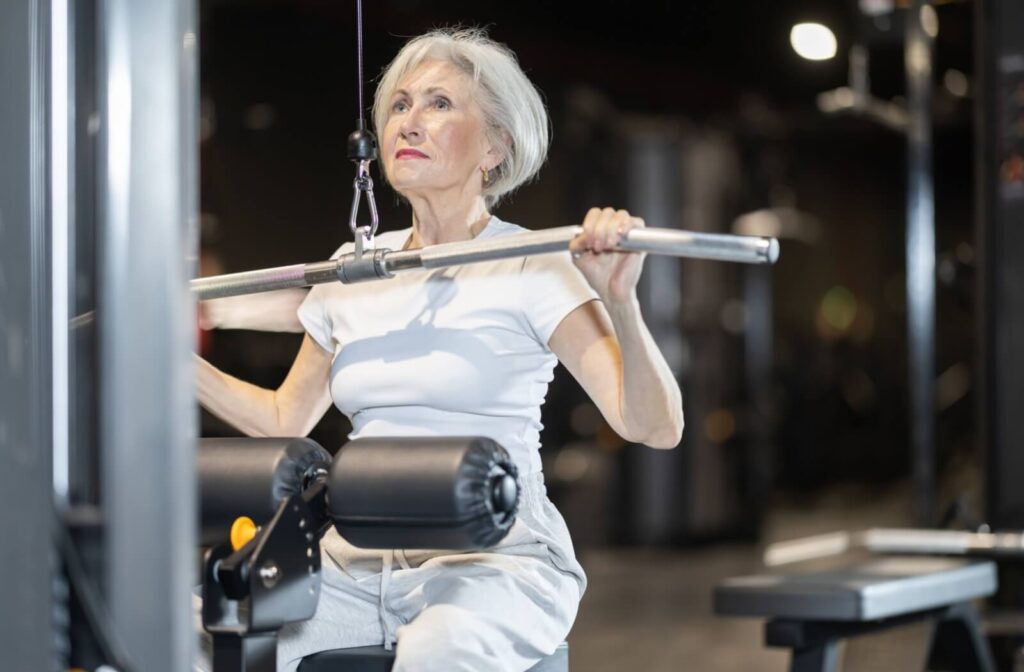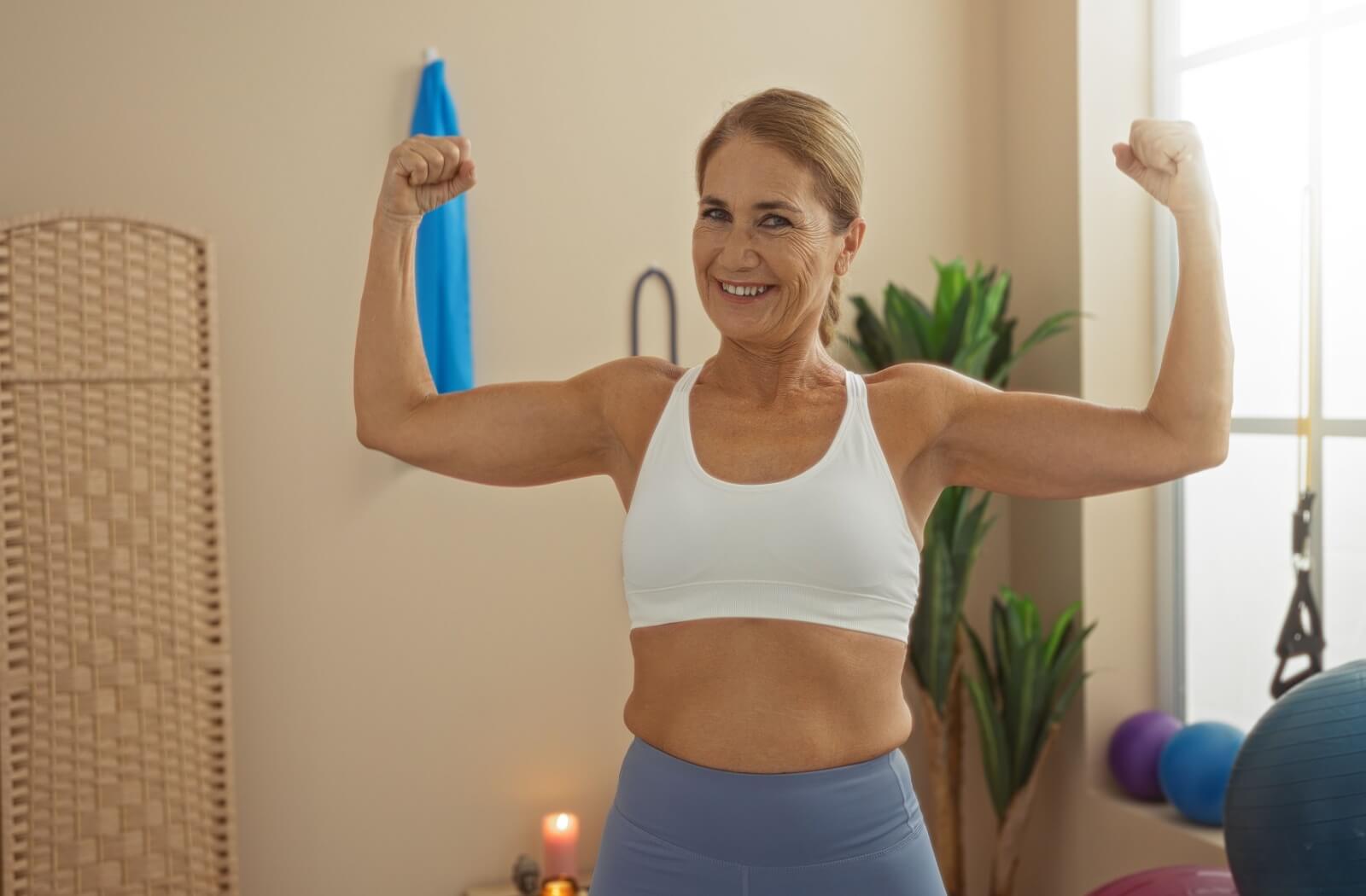Key Takeaways
- Bone health is vital for seniors to reduce the risk of fractures and maintain independence.
- A diet rich in calcium, vitamin D, and protein supports strong bones.
- Lifestyle habits, such as regular exercise, adequate sleep, and avoidance of smoking, can help improve bone density.
- Small, consistent changes can lead to long-term benefits.
How Seniors Can Improve Bone Health Naturally
As the body ages, bone density naturally decreases. This process, known as bone loss, begins as early as midlife and accelerates with age. For seniors, protecting bone health is essential to reducing the risk of fractures and maintaining independence.
By focusing on natural strategies such as eating a nutrient-rich diet, staying physically active, practicing balance and flexibility exercises, and maintaining healthy lifestyle habits, seniors can naturally improve their bone health. These steps not only keep bones strong but also support mobility, confidence, and overall quality of life.
Why Bone Health Is Important in Aging
Weakened bones can contribute to conditions like osteoporosis, where even minor falls or bumps may cause significant injury. For older adults, a broken hip or spine fracture can lead to serious complications, hospital stays, and long recovery times.
Strong bones also support posture, mobility, and daily movement. Seniors who focus on bone health are more likely to continue enjoying activities like gardening, walking with friends, or playing with grandchildren. In short, bone health plays a major role in overall quality of life.
Understanding Osteoporosis and Bone Loss
Osteoporosis affects millions of older adults, especially women after menopause due to hormonal changes. While genetics play a role, lifestyle factors often determine how quickly bone loss occurs. Fortunately, natural strategies can help slow or even reverse some of these changes, making prevention possible at any age.
Natural Ways to Strengthen Bones
Good nutrition is the foundation of bone strength. Seniors who prioritize nutrient-rich meals can give their bones the raw materials needed to stay strong and resilient.
Focus on Calcium-Rich Foods
Calcium is essential for bone structure. Older adults should aim for about 1,000-1,200 mg of calcium per day. Instead of relying only on supplements, try:
- Dairy products like milk, yogurt, and cheese
- Leafy greens such as kale and bok choy
- Almonds, chia seeds, and sesame seeds
- Fortified plant-based milks for those who avoid dairy
Get Enough Vitamin D
Without vitamin D, the body cannot absorb calcium efficiently. Seniors often have lower vitamin D levels due to reduced sun exposure or changes in skin function. Natural sources include:
- Sunlight exposure for 10-15 minutes a day (when safe)
- Fatty fish such as salmon, mackerel, and sardines
- Eggs and fortified cereals
A simple blood test can confirm if supplementation is needed.
Prioritize Protein for Muscle and Bone Support
Protein builds muscles that protect bones. Seniors who eat enough protein often maintain better balance and coordination. Add protein to every meal through lean meats, beans, lentils, tofu, nuts, and Greek yogurt.
Add Magnesium, Zinc, and Vitamin K
Beyond calcium and vitamin D, other nutrients also play important roles:
- Magnesium supports bone structure and is found in spinach, avocados, and nuts
- Zinc aids in bone tissue renewal and is found in beans, pumpkin seeds, and whole grains
- Vitamin K regulates calcium balance and is abundant in leafy greens and broccoli
Hydration and Bone Health
Staying hydrated helps deliver nutrients to bones and joints. Seniors should aim for 6-8 glasses of water daily, adjusting for activity and climate.
What Lifestyle Habits Support Bone Health?
Nutrition alone isn’t enough. Lifestyle choices and daily habits also shape bone strength. Seniors who stay active, avoid harmful substances, and care for their overall health protect their bones naturally.
Stay Physically Active
Weight-bearing and resistance exercises stimulate bone growth. Some effective activities include:
- Walking, especially outdoors
- Dancing or light aerobics
- Strength training with light weights or resistance bands
- Gardening and yard work
Even 20-30 minutes of movement most days of the week can make a noticeable difference.
Practice Balance and Flexibility Exercises
Improving balance reduces the risk of falls, which are the leading cause of fractures in older adults. Activities like yoga, Pilates, and tai chi improve flexibility, coordination, and confidence while moving.
Maintain a Healthy Body Weight
Extremes in body weight can harm bone health. Seniors who are underweight may lose bone density more quickly, while those carrying excess weight may put strain on joints and bones. Focusing on balanced meals and regular movement helps achieve stability.
Limit Alcohol and Avoid Smoking
Smoking interferes with calcium absorption, while heavy drinking weakens bone structure. Choosing to quit smoking and moderating alcohol consumption are two of the most impactful lifestyle decisions for bone health.
Prioritize Restful Sleep
Bones repair and rebuild during sleep. Adults who consistently sleep fewer than 7 hours per night may experience higher rates of bone loss. Creating a calming nighttime routine—such as limiting caffeine, dimming lights, and sticking to a schedule—can improve sleep quality.
Manage Stress Levels
Chronic stress produces hormones that interfere with bone-building cells. Relaxation practices like meditation, breathing exercises, or spending time in nature can help manage stress and support long-term bone health.

What Are Some Everyday Tips for Seniors to Support Bone Health?
Putting these practices into action doesn’t have to be overwhelming. Small, consistent changes build lasting habits.
- Pair calcium-rich snacks with vitamin D sources (e.g., yogurt with fortified cereal).
- Take daily walks with friends or neighbors for exercise and social connection.
- Keep resistance bands at home for quick strength-building sessions.
- Choose stair walking over elevators when possible.
- Schedule regular health check-ups and bone density screenings.
These practical steps create momentum and make bone care part of everyday life.
Supporting Healthy Living in Tinton Falls
Maintaining strong bones naturally is about more than just avoiding fractures—it’s about protecting independence, mobility, and confidence. Through nutrient-dense meals, regular exercise, restful sleep, and healthy daily choices, seniors can give their bones the support they need.
At All American Assisted Living at Tinton Falls, residents benefit from a lifestyle that supports bone health in every way. From chef-prepared meals rich in essential nutrients to fitness opportunities and wellness programs, our community helps seniors embrace habits that keep their bones strong and spirits high.
If you’re considering assisted living for yourself or a loved one, we invite you to schedule a visit and see how our community fosters healthier, more active living for seniors.





